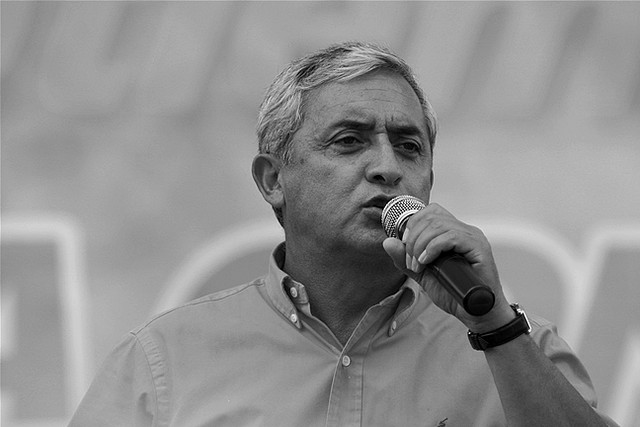The Guatemalan government could soon take a 40% stake in mining companies in the country if a proposed constitutional amendment goes through.
President Otto Perez Molina announced the proposed change, along with dozens of others, in one of the country’s national newspapers, while the amendments won’t be formally introduced to Congress until July 16.
News of the proposal, however, sent Tahoe Resources’ (THO-T, TAHO-N) share price down $6.43, or almost 40% before trading was halted, as investors feared a partial seizure of the company’s advanced-stage Escobal silver deposit.
Tahoe issued a brief release insisting that, after speaking with high-level officials, it is confident the amendment would not apply to its wholly owned Escobal project under construction. Company CEO Kevin McArthur stated that “the government of Guatemala has not made any approach to the company regarding this proposed reform, nor do we expect it to.”
Reuters reinforced the statement, quoting government spokesman Francisco Cuevas as saying that the law would only apply to new mines, not companies already operating in the country. The proposal also does not set out how the government would secure its stake in future mining companies.
When Tahoe’s trading resumed the company regained some ground, but still closed down $3.67, or 22.7% at $12.50, after trading at a 52-week high of $23.89 in March. Goldcorp (G-T, GG-N), which owns the operating Marlin gold mine in the country, dropped as much as $1.84, or almost 5%, before closing down $1.07, or 2.8% at $37.31. Anfield Nickel (ANF-V), which is advancing the Mayaniquel nickel project on Lake Izabal, dropped 64¢, or 17% on the news, to close at $3.09. Radius Gold (RDU-V), with several early and advanced-stage properties in the country, dropped as much as 4¢, or 21%, before rallying and ending up 7¢, or 35% at 25¢.
The constitutional proposal to take a stake in mining companies comes only days after the country introduced amendments to 30 articles of the country’s Mining Act. Of note, the amendments formalize the royalty regime that had been voluntarily agreed to by foreign mining firms, including a royalty rate of 4% for gold and silver and 3% for base-metal production.
Guatemala has long been a difficult place for foreign mining firms to operate, facing sometimes vocal and aggressive opposition to mining projects. Goldcorp’s Marlin mine has been heavily criticized by locals and foreign advocacy groups since its start for the apparent environmental damage it has caused and its lack of consultations with locals. Facing continued criticism, Goldcorp agreed to a higher 5% royalty on production from the mine in an effort to better compensate locals.
More recently, Radius Gold has been unable to advance its small-scale El Tambor gold mine since early March because of a local blockade. The situation escalated on June 13 when anti-mining activist Yolanda Oqueli Veliz was shot near the blockade. Veliz is recovering, while Radius has condemned the violence and denies any link to the shooting.
Tahoe has also experienced opposition to its project, but the high-grade, 3,500-tonne-per-day underground mine is an easier sell than an open-pit mine like Goldcorp’s Marlin. The Escobal project is also located away from the highlands, where mining opposition is strongest.
Tahoe is moving ahead with mine construction, with production targeted for 2014. The company secured its environmental permit last year, which allowed it to start initial development, while it expects to receive its exploitation permit that would allow complete development sometime this year. So far the company has spent or committed US$141 million towards the project, and expects the full cost of the mine to be US$327 million.
Based on a 2010 preliminary economic assessment, Tahoe expects to mine 22.7 million tonnes grading 415 grams silver per tonne, 0.47 gram gold per tonne, 0.71% lead and 1.22% zinc, for 298.4 million contained oz. silver equivalent over an 18-year mine life.
At US$18 per oz. silver and US$1,100 per oz. gold, the after-tax net present value was calculated at US$1.73 billion using a 5% discount rate, and the after-tax internal rate of return was 51.4%.


Be the first to comment on "Guatemala proposes 40% stake in mining companies"